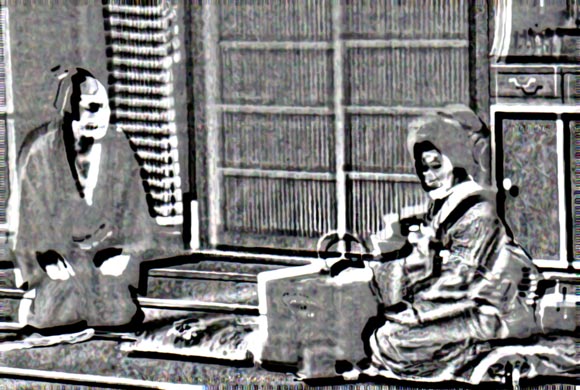| MABUTA NO HAHA |
| Play title | Mabuta no Haha |
| Author | Hasegawa Shin |
| History |
The drama "Mabuta no Haha" was premiered in March 1931 at the Meijiza, starring Morita Kan'ya XIII and Onoe Taganojô III in the roles of Chûtarô and Ohama. Later on, it was also staged outside the Kabuki world, with the actors Shimada Shôgo and Hisamatsu Kiyoko in the roles of Chûtarô and Ohama. It became very successful and was adapted for movies several times. It also became the theme of many popular songs. |
| Structure |
"Mabuta no Haha" is made up of 2 acts. |
| Key words | Sewamono Shinkabuki Matatabimono |
| Summary |
The main character is Chûtarô, who together with Hanji, is responsible for the murder of a gambler boss. They are both on the run and Hanji returns home to a chastening welcome from his disappointed mother and sister. They tell him to keep away from Chûtarô's bad influence. Chûtarô is touched by their protective love toward Hanji. Even though his mother is alive somewhere, he has been separated from her since he was five. His father died when Chûtarô was 12 and he has no other family. He has created in his mind an ideal image of the mother he misses, and is distressed to see the pain Hanji is causing his mother. Gangsters on their trail find Hanji's house and challenge him to a fight, but Chûtarô emerges from the shadows and kills them both. Then, because he is illiterate, he asks Hanji's mother to guide his hand over the paper as he writes a confession taking all the responsibility himself. The touch of her hand on his brings tears to his eyes and he chokes back his longing to have such a loving mother of his own. As he stands to leave, Chûtarô exhorts Hanji to turn over a new leaf, and then quickly departs. As Chûtarô journeys he finds himself attracted to every woman of approximately his mother's age. He helps some of them out, and gives money to others, always engaging them in conversation about whether they have children. One woman tells him that she used to be friendly with Ohama, the now prosperous owner of the Mizukuma geisha-restaurant. Ohama had once wept about leaving behind a small son, but by now she may have forgotten all about the son, and in any case Ohama doesn't lower herself to speak to her anymore. Chûtarô finds the restaurant and persists until he is reluctantly allowed in. Ohama greets him brusquely and tells him he'd better state his business and quick. Chûtarô gets right to the point, and as he talks Ohama is clearly startled although she tries to cover it up. The places, dates and names of his story match up with hers, but she still denies that she is his mother. She is resentful at his coming along and disturbing her life. In fact she understands what he is really after--by pretending to be her son he's hoping to get half of her restaurant, but he doesn't fool her. These words pierce Chûtarô's heart and he cries. He asks her one last time if she is his mother, but she denies it. Her son is dead, but even if he were to come back from the grave she wouldn't be overjoyed, she coldly tells him. Chûtarô takes his leave, regretting that he has ever met her; his dream since childhood of being reunited with his loving mother has been crushed. Shaken by the encounter, Ohama relents of her cynical attitude and together with her daughter, Chûtarô's sister, attempts to catch up with him. They search high and low shouting out his name, but cannot find him. In fact, he knows they are there but hides himself. Why should he come out from hiding when all he has to do is close his eyes and remember the mother he has always imagined? He remains hidden until they give up and leave. Courtesy of Jean Wilson (1998) |
| Comments |
This painful conclusion is actually one of three alternative endings to the play. Other versions have been produced with a reconciliation taking place. This version strongly emphasizes the feelings of hurt, resentment and bitterness that Chûtarô feels at this cruel twist of fate, and of his washing his hands of Ohama. We sense that he will never again try to search for his mother but will return to being a traveling gangster, killing when he has to, and living henceforth only with the comfort of his imaginary mother hidden in his heart. |
| Trivia |
"Mabuta no Haha" was inspired by Hasegawa Shin's life story and his search for his mother who left home when he was about eight years old. He met up with her again 47 years after she left him. |
 |
|
The encounter of Ohama and Chûtarô (a digital painting made by Shôriya Araemon in 2009) |
|
|
| Contact | Main | Top | Updates | Actors | Plays | Playwrights | Programs | Links | FAQ | Glossary | Chronology | Illustrations | Prints | Characters | Derivatives | Theaters | Coming soon | News |